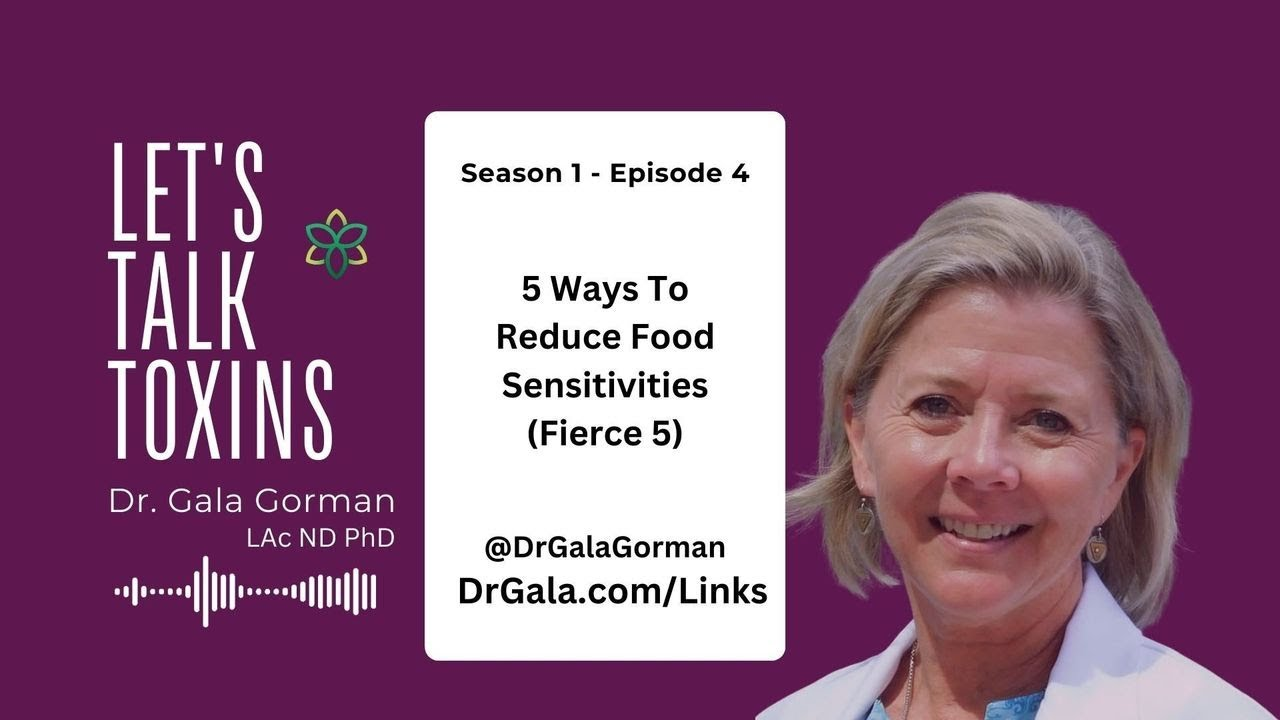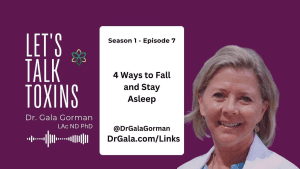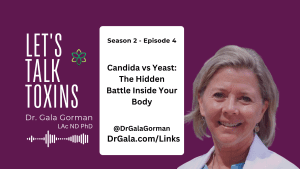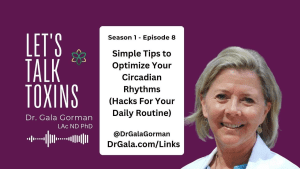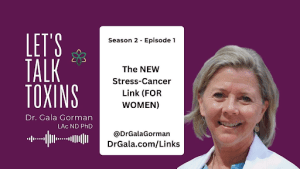NOTE: A machine generated this transcript. Please be aware that it may contain occasional errors in punctuation and spelling.
One of the things that I wanted to caution you here is that eating a lot of raw food can really create additional risk. Even just eating salads and other sorts of raw vegetables can be risky if you’re not washing them, cleaning them properly. This bacterial toxicity is causing internal stress and the body is more vulnerable when it’s already under stress.
Welcome to the Let’s Talk Toxin show. Are you feeling bloated or nauseous after meals? Well, before you turn to medication or supplements to relieve the discomfort, there are some things you need to understand. In this episode, we’ll explore five simple ways to manage the cause of your symptoms. The food you’re consuming maybe doing damage to your body. Applying the tips and strategies I suggest here could transform your relationship with food.
Improving your diet is the easiest way to boost your overall well-being. These simple changes might just be what you’ve been looking for to reduce toxic stress.
And if you’re new here, I’m Dr. Gala Gorman, a licensed acupuncturist, naturopath, and author of “What’s Your Kryptonite?” I wrote the book to help women understand the effects of chronic stress that’s turned toxic. In the book, I share the MOLT Method™ I developed to make it easy to shed stress. Along with the accumulated toxicity, just like any other creature in nature that’s outgrown its trappings. So that you can cruise through midlife and beyond symptom-free. So that you can put an into health issues like chronic fatigue, insomnia, mood swings, and even weight gain.
So MOLT, in this case is an acronym. The T stands for toxins. And I can say with confidence that every symptom is caused by accumulated toxicity. I evaluate 12 categories of toxicity. When I’m working with someone to unravel a health mystery. Our world is full of man-made substances that our bodies were not designed to deal with. Coupled this toxicity with an overwhelming amount of toxic stressors the body was designed to manage. And it’s no wonder women find themselves playing whack-a-mole with symptoms.
So here’s a report that’s a great example of what might be thought of as a toxin trend. So in this particular report here, they were talking about bacterial toxicity. A recent study discovered that some bacteria can become, they’re calling it hangry, releasing harmful toxins when they lack nutrients. So, you know, think of the Seymour plant and how it basically needed to be fed constantly.
So this bacteria is sucking off the nutrients that your body would normally be using to fuel the rest of your cells and processes in your body. Researchers found that even genetically identical bacteria can behave differently. Some are calm, while others produce toxins that can make us sick. So that just seems odd, right? So it’s not just the type of bacteria, it’s actually something inherent about that bacteria’s almost “emotional wellbeing.”
So, you know, these Tricky Toxins, if you will kind of adopt my thinking about them really do take on a life of their own. So, this was published in nature microbiology, and this research could help develop new strategies to combat antibiotic resistance.
So, if you think about it, we are trying to create antibiotics that are addressing a certain type of bacteria. But if that bacteria, single bacteria isn’t even acting the same, depending on the environment that it’s in. It makes developing a treatment for it really challenging, which basically leads me to remind you that our body is designed to deal with these foreign pathogens and bacteria.
And so the reason why our body can’t manage it when it gets sort of overwhelmed by an infection, is because there’s some stressor that is essentially weakening our body’s ability to deal with it. When our body is stressed, our immune system is taken offline. And that leaves us really vulnerable.
One of the things that I wanted to caution you here, is that eating a lot of raw food can really create additional risk. You may have heard that if you’re eating under cooked meat or raw fish that it’s common to get a parasite overgrowth, parasitic overgrowth. But even just eating salads and other sorts of raw vegetables, can be risky if you’re not washing them, cleaning them properly.
So really important, you know, I am a salad lover just like you might be. But it’s really important to make sure that whatever you’re consuming is really clean. This bacterial toxicity is causing internal stress and just like I said a moment ago, the body is more vulnerable when it’s already under stress.
And so now basically you’ve introduced additional stressors to an already stressed body and you can see why this is a recipe for disaster. So, really important that we monitor these different types of toxicity that we come into contact with and work to minimize them as much as possible. There is absolutely no way to eliminate them. That’s not even something we’re shooting for, but we can mitigate their effects and manage the overall toxicity level in our body.
In my book, Chapter 12 is dedicated to talking about these tricky toxins. So it really helps readers manage them and you know, our bodies are bombarded with toxicity, so we have to learn to manage it. If you’ll comment, “tricky toxins,” we’ll send you a link where you can download the chapter for free. Again, this is Chapter 12 in a “What’s Your Kryptonite?”, my book, “What’s Your Kryptonite?”. And just know that it’s absolutely free, you will download a lovely, little report. I put the single chapter into a report for you that’s easy to download and read.
And so, if commenting isn’t convenient for you, go to DrGala.com that’s D-R-G-A-L-A.com slash links, and sign up for my Wellness Weekly Newsletter. You can do that anyway, I’d love to have you as part of my community. And just know that you can respond to any email you received from me with tricky toxins, and we’ll send you a link.
So, every week with these episodes, I like to share just some lesson I’ve learned. And to essentially share with you that I have the same challenges you do. And I am regularly challenged to Walk My Talk. And so in this walking my talk segment, just know that every suggestion you’ll hear from me has been tested in the trenches. And that includes saying no to symptom suppression.
Over the past four decades, I’ve developed processes that work sustainably. Typically, it requires a combination of approaches that I’ve synthesized to address the health issues that show up repeatedly for many women. Recently, I had an opportunity to Walk My Talk and basically to apply one of the seven ways that I share in my Human Energy System Reboot kit.
And so, one of those seven ways is to avoid what I refer to as the Fierce 5. You may have heard me talk about this previously. The Fierce 5 is dairy, gluten, yeast, sugar, and alcohol. And so, I am, again, just like you, I find myself consuming too much of these five things really regularly.
I have learned to use them in moderation. And so, you know, I’ll have a glass of red wine regularly. I eat a little bit of ranch dressing and might have some cheese, occasionally. It’s not really easy to find sheep’s milk cheese. So if that’s not handy, then you’re going to have this crazy dairy reaction.
Fortunately, our body typically can handle a little bit of it without completely blowing a gasket. Gluten, again, gluten’s an odd thing because some gluten creates more of a problem than others. So, you are feel a little bit like you’re playing Russian Roulette. Yeast, again, yeast overgrowth can really be a problem, but when you don’t have a yeast overgrowth, a little bit of yeast doesn’t tend to create a big problem.
And then sugar, I really love a little piece of cake for dessert. And so, I’ll even buy a piece of cake and it’ll take me three days to eat that. But I do have a sweet tooth. You may share that with me. I grew up in the south and no meal was finished without having a little something sweet. So, it’s just important that we moderate these things and I do a really good job of that, but when I’m stressed, it isn’t enough.
And so, what I find is that when I’m stressed, I really have to not just moderate, but actually eliminate these Fierce 5, essentially. And that’s really challenging because when we’re stressed, we really want to reward ourselves or sooth ourselves, if you will, with some of these things that we feel like bring us comfort.
Honestly, they provide a little comfort in the short term. And the longterm, they make the problem worse. But just know that there are times when you need to up your game and moderation isn’t good enough. You’re actually going to have to do a better job. What I typically find is that I have to eat at home more.
It’s really easy for me to moderate and eliminate a lot of these things when I eat at home. It’s when I go out to restaurants that I really tend to have a problem.
So now let’s talk about the five ways to reduce food sensitivities. And when I’m done, drop a comment and let me know what foods you struggle with and any tips you found helpful.
So first, I want to talk about the difference between a sensitivity and an allergy. So, if you have a true allergy to something, you’ll have an allergic reaction and it will probably escalate to anaphylactic shock. That means that your airways will be restricted. You may have trouble breathing. And that is very serious, a serious medical condition that probably will land you in the emergency room of the hospital.
So most of us don’t have a true allergy to something. We are sensitive to something. Most of us, if we have an allergy to something, we know it and we try to be very careful that it doesn’t like sneak into our diet in some way. But if we have a sensitivity to something, our immune system is activated when that thing is introduced into our system.
And so, essentially your immune system sees it as a foreign pathogen, and it’s going to spike a reaction. And you may not really put two and two together. It’s often not logical, like the kind of reaction that you will see from a food sensitivity, doesn’t seem to directly correlate with what kind of symptom that you’re experiencing. So, the thing I recommend to everyone that I work with is to not use the symptom suppressors.
Those are the things that are designed to deal with acid reflux and, you know, some of these other sorts of pain relievers, if you will. When you start turning to those, then basically your body is crying for help. Your putting a muzzle on it, and all of those reactions are still going on, and they’re escalating internally and dis-ease escalates to disease.
So, you definitely do not want to be using this strategy. Better we want to avoid using the symptom suppressors and we want to learn to identify the food sensitivities. So, there are food intolerance tests and they tend to be blood tests. Blood tests are the best ones. I will say that they’re expensive and can be extremely helpful if you’re really struggling with this.
And you’ve tried my Fierce 5 elimination strategy and you’re still having issues you just may have somethings that are just sort of odd and more unique to you that you specifically need to avoid. So a food intolerance test might be something that would really help you a lot. But just know that these intolerances might be just genetic, like there’s a genetic component essentially.
And so, a lot of times, the genetics will develop over several generations. And if you think about the genetic makeup, essentially. If you’ve just got three generations of people sort of coming together and mixing up the gene pool. Your native genetics are very much diluted at that point.
So, a native diet is often recommended but I will say that it’s typically not enough at this point for most people.
You know, not to mention the fact that our native diet really is no longer a native diet. We’re going to talk about that a little bit more in a minute. So, the symptoms that you’re going to be recognizing are things like bloating and nausea, we mentioned that at the beginning here. But you’re also going to potentially have bowel issues, constipation, diarrhea.
You could have skin eruptions, sinus issues, headaches, there really is a broad range of symptoms that can be directly correlated to food intolerances. And again, they don’t necessarily seem like they should be related, but try eliminating something that has been identified as a problem for you, and you will find that the symptoms just receive. Your immune system, just regulates itself and you really will have a much easier ride through life.
You’ll find that those things that really irritated you no longer seen that intriguing when you notice that you feel so much better by eliminating them.
So, as I mentioned a moment ago, I developed a process. I call it the Human Energy System Reboot, and it’s a 10 day process. We spend the first couple of days planning and preparation, and then it’s a 7-day elimination essentially. And then we spend the last day just reflecting on what worked and what didn’t, because this is not a one-time process.
This is something that you might want to practice even once a month, once a quarter, certainly once or twice a year. But the reboot basically includes seven ways that I have assembled together to strengthen your body while you’re also reducing the toxicity. So it works really well and it’s pretty quick and easy, a really quick and easy way to be introduced to my process and my philosophy as well.
So if you go to DrGala.com/Links, you’ll see a link to the Human Energy System Reboot so you can check it out.
As I mentioned a moment ago, we’re going to avoid the Fierce 5. That’s one of the seven ways in the Human Energy System Reboot. And as a reminder, the Fierce 5 is dairy, gluten, yeast, sugar and alcohol. And, we talked about this a moment ago, but just to remind you that in this particular case, we’re going to eliminate these things for this week of the reboot.
We’re going to eliminate them versus moderate. We can moderate things on an ongoing basis. Typically, once we’ve sort of met our health goals, but when we’re really under a lot of stress or things start to accumulate, and you’ll know, you’ll start seeing the signs of a toxic buildup.Then, we need to lean into a reboot and an elimination for a week or so. And you’ll find that your body will respond really well to this.
So, again, remember you can get the Tricky Toxins chapter of my book, “What’s Your Kryptonite?” for free. Just comment “tricky toxins,” and we’ll send you a link where you can download the chapter. If commenting isn’t convenient, go to DrGala.com/Links and sign up for my Wellness Weekly Newsletter. You can respond to any email you received from me with tricky toxins, and we’ll send you a link.
So, let’s continue with the impact of food toxicity on our immune system. And remember when you’re done, share your thoughts on how food choices have influenced your health. So, when we are consuming food that is not agreeing with us. Our immune system is essentially on fire.
So, imagine that you’ve consumed something and you’ve gotten food poisoning. The system, your internal system, recognizes that significant toxic substance, whatever that was. And it says this is out of here. And it’s a very unpleasant experience while your body purges all of that and tries to reregulate itself. But this is essentially what your body is experiencing on a very reduced level when you’re consuming things that are irritating your internal systems.
So, we use the reboot because it reduces this experience for your body, even if just for a short period of time. And sometimes, the reboot is enough to just kind of clear out the reaction, if you will. But what we often find is that, after the reboot, when we re-introduce some of these things. We’ll find that we noticed the reaction more, and this is exactly what we want because we want to actually know what’s causing us a problem. I’ll give you an example myself. So, I am sensitive to spicy foods.
I don’t eat a lot of spicy foods and so when you order guacamole, I love guacamole, when you order guacamole a lot of times a restaurant will put whole peanut peppers in it. And I can find places sometimes that will make the guacamole for me and leave the jalapeno peppers out.
They have to be able to make it fresh, which honestly makes it so much better anyway. But not every restaurant’s prepared to do that, a lot of times they’ve got it pre-made.
And so, If I consume peppers on an ongoing basis, I can kind of feel that my body is reacting to it, but it isn’t a severe reaction. But I can tell you that after a reboot, whenever I re-introduce the peppers, I will have a significant reaction to the point sometimes of even having a histamine response where I’ll get like a flush of red on my skin and that sort of thing.
And so, we love to see these kinds of reactions that we can directly correlate with something. Because once you really understand what’s going on, it’s super easy to just make the decision to avoid it. You know, I avoid hall peanut peppers as much as possible. And if that means I eat a heck of a lot less Mexican food. That’s not going to kill me. I’ve got other things that I really enjoy that my body does think is a healthy thing that’s not gonna really spike my immune system. So it’s not like I’m going to starve.
Just know that one of the things that takes our immune system offline is stress. We’ve talked about this as we’ve moved through here. And so we often think of food as something that is going to soothe our stress. But when we eat when we’re stressed, our digestive system simply is not working optimally.
In fact, your digestive system requires parasympathetic nervous system activity. Meaning you’ve got that relaxation response going on internally. That is when your digestion works the best. And so, you really want to be eating when you’re happy, not when your stressed and anxious. Often we think of food kind of as entertainment, and you know what, that’s not necessarily a bad thing if you’re really enjoying the food and it makes you feel good and maybe you’re enjoying it with friends that you really have a good time with.
Using food as entertainment is not the devil, if you will. Rather, the problem is when we turn to food when we’re really emotionally distraught or really having a challenging time. And in those cases, you want to make sure that, if you do need nutrients that you’re eating really clean, healthy food that agrees with you. And that requires as little digestion as possible. So, in these cases, it’s really helpful to turn to a really soothing, nourishing soup or something along those lines that can be really easy on your digestive system and be really supportive as your getting through whatever stressful experience you’re going through.
You want the food to be satisfying. But it doesn’t necessarily have to be some really bad for you food to be satisfying. What I find is that the most satisfying meals are the ones that I know are really healthy and they still taste great and make me feel good. When we’re stressed, we tend to make bad decisions and so the best thing you can do when you’re in a stressful situation is to just eat very little and eat as healthy as possible. We really just want to eat what we love, but we want it to also love us.
The answers I give to questions I receive quite often apply to and would be helpful for most women. I’ve accumulated a few related questions here. And if you’d like to ask a question, I created a form so that it’s sure to get answered. And your question could be shared in a future episode, helping many other women. So comment “QUESTION”, and we’ll get you a link to the form. And if commenting isn’t convenient, go to DrGala.com/Links and sign up for my Wellness Weekly Newsletter. You can respond to any email you received from me with “QUESTION,” and we’ll send you a link.
So, here’s the first question.
Have you noticed this sensitivity to certain foods seems more common these days?
Well, we could look at it like it’s more common, but I think that what’s really more common is that stress is really a common place. And we’ve kind of conditioned ourselves to think that living in a highly stressed state is just a fact of life. In some ways, we actually think we’re thriving on it when you see people who are consuming energy drinks, for example. You know, this is somebody who really thinks that caffeinating themselves and staying on that really like heightened energy mode is doing them favors with productivity and potentially even with their health, but it’s exactly the opposite.
You’ll find that, you’ll burn out and you’re burning out your adrenals and and your stress is taking your immune system offline and that is creating additional issues. So, what I do find, I believe now is that there are more toxic ingredients and this is more common. We eat packaged food regularly, and the things they use in the packaging or just preservatives can definitely add to the toxicity and this toxicity accumulates over time.
You know, our body does a really great job of managing the toxicity until it just accumulates to the point where it can’t manage it any longer. So, what you really want to do is make it a point to look at those labels. If you are consuming anything that is packaged, which honestly we all do, right. You want to look at the ingredients and you want to make sure that they’re real ingredients.
For example, I use gluten-free pasta and the company that makes this gluten-free pasta, there are two ingredients, it’s brownrice flour, and water. And so, you know, is there a bad ingredient in there? Might it be better if I made homemade pasta with my own flour? That isn’t going to happen. But the next best thing is using a really clean pasta that has the ingredients that aren’t going to spike the immune system and add toxicity. So it’s just an example.
If you’ll look at the packaging, you’ll be able to see what’s in it. And honestly you’ll find that there may be things that you’ve been consuming even for a long time that have crazy ingredients. And you’re just gonna have to set that aside and find a substitute that’s a much healthier substitute. It might take you a little time to sort of adjust your taste buds for it, but it’ll be really worth it in the long run.
The other thing too, I’ll say is there’s just more genetic diversity now. We’re further away from the native diet and the native environment where people were really all very similar in their genetic makeup. And so that contributes to every body vaving issues to some degree with these food sensitivities.
Do you think our genetics play a role in how our bodies react to different foods?
Well, there’s definitely an element of genetics that goes into this, but I will say that the native diet is not nearly as important as it was thought to be even just like a decade or so ago. And there are a couple of reasons for this. One again, is that we’re just getting further and further away from that sort of genetic purity, if you will. Where there’s you know, a much tighter genetic pool. But also, I will say that, for example, let’s just say that you’re Greek.
My husband is a Greek heritage. He’s pure Greek. His grandparents were Greek. Both of his parents were Greek. He’s pure Greek. And so, naturally, he would normally eat a Greek diet, right. A Mediterranean diet, Greek food. And that that would be great for him. And it would potentially be great if he was living in Greece and he was consuming goat or sheep dairy. And he was consuming wheat that was grown without chemicals and and was harvested appropriately.
But that’s impossible now. So we can’t just turn to what would be a native diet and think that we’re going to solve this problem. We really have to look at generally, how can we get the cleanest food possible? That’s going to have the least potential reactions in our.
Dairy, for example, has a certain enzyme, enzymatic structure, essentially that we just are not designed to break down. And so it’s interesting because I was at a farmer’s market a year or so ago. And I was talking to a goat farmer and she said that goats, some goats have the same enzymatic structure in their dairy that cows do. And I had noticed that sometimes with goat dairy, I would have a reaction to it similar to what I would have with cows milk dairy.
But it was like hit or miss, and I couldn’t figure out what was going on while the what’s going on is that we have no way to know. How that animals bi-product is going to react in our bodies. And what she did say was that all sheep have a different enzymatic structure in their milk. And so sheep’s milk dairy tends to not have the same sort of reaction.
So these are the kinds of things that we just have no control over, and really they’re random things that are hard to control. Or even hard to really understand, so you just have to look at some of these things and say, you know, is it worth trying to find just the right source that I can still consume? Or is it easier just to eliminate it? And sometimes it’s something you really love and it’s worth finding a source that really doesn’t create a reaction for you. And other times it’s like, eh, just eliminate it. It’s easier.
The other thing too, that I will mention here is about wheat. When I was talking about my husband and his heritage and when we were hiking across Spain last year. It was really fascinating cause we went through, you know, miles and miles and miles of wheat fields.
And I essentially ate my weight in croissants. But what I found was that I could eat the croissants out in the country where basically they used more local flour and a higher quality, more local ingredients.
But when I got to the big cities where they basically were just using highly processed ingredients. Those things like a croissant one, didn’t taste nearly as good. And two, I found that I would have a reaction to them. So there again you know, is it just easier to say I’ll just eliminate it. Sure. But boy, those croissants were good.
Are you concerned about the potential toxicity of our modern food supply?
Well, the most toxic ingredient that’s in just about everything is fats. And these really bad fats like canola oil and safflower oil. Those sorts of fats are really, essentially impossible for our bodies to break down it. They do accumulate toxicity. There are some fats that we can replace them with, but if you’re eating out regularly, that’s just not going to happen. The only thing you’re going to be able to do here is to remove those fats with some sort of targeted detox fairly regularly.
The other thing I will say is that preservatives are in just about everything. And this is something I found many years ago that created a big problem for me. Many years ago, you may remember that everybody got into eating salads, right? And you didn’t have to ask me twice, I love salads. So fast food restaurants started having salad bars. And so, that seemed to basically solve the problem for a lot of people who were, you know, turning their nose up at fast food restaurants, right?
But what I found was that they were putting preservatives in the vegetables, but even if the vegetables were fairly clean and they weren’t really putting preservatives in them, the dressings were essentially kryptonite for me. And so any sort of bottled pre-made dressing is almost always going to have bad fats and protein preservatives. So the combination of the bad fats and the preservatives pretty much makes any sort of salad from a lesser quality place, a non-starter for me. And it probably should be the same for you as well.
The other thing I will say is that packaging can be really toxic. There are BPAs, other sorts of chemicals, waxes and that sort of thing that they use with packaging. Even with packaging that is kind of designed to look like it’s pretty healthy. You want to make sure that you are looking for, if you’re eating anything out of a can, look for BPA free lining. And really, know where you’re sourcing things from and that the packaging is not adding toxicity.
If you are spending a lot of money on healthy food and trying to eat really well and then you’re ending up with preservatives and toxic packaging or, you know, bad fats. You’re not doing yourself any good. And you’re wasting your money. Your money is better spent on doing some sort of targeted detox.
Do you find yourself turning to food for entertainment rather than nourishment?
I like to use this example. So in the movies, and I will admit, I watch a lot of Hallmark movies because they just put a smile on my face, fill my heart. And it’s a great way to go to bed with, you know, visions of sugar plums, essentially. When I watch any sort of upsetting, distressing, emotionally, turbulent movie, before I go to sleep. I am guaranteed to wake up in the middle of the night really triggered by that.
So, if you find that something like that’s happening for you, like me, may want to subscribe to the Hallmark channel. But one of the things in these movies, in fact, I just watched one last night. It was just a lovely little movie where the chef of a restaurant had come from Italy. And they shared on their night off, a family-style meal. And they just really enjoyed the friendship and you know, the feeling of family, even among people that were not blood relation.
And so, sharing a meal can be really nourishing and healthy. And so, if your idea of entertainment is having a dinner party or really enjoying an evening out with friends. Just know that’s good for you. Do not be concerned about that. Obviously, it’s going to be better if you eat some place where you can get high-quality food and you know, eat things that are really gonna agree with you. But you can get away with a lot when your nervous system is really soothed by the oxytocin that you’ll get from sharing a meal with somebody that you care about.
The other thing that is important to know here is that hunger is just a hormone. And so this is kind of interesting because we’ve been conditioned to think that we just needed to respond as quickly as possible when that hunger hormone sends us the signal.
And know, a lot of times, because that hormone might come at a time that’s not so convenient. We tend to make bad decisions and sort of reach for something just to quiet that hunger hormone. But again, it’s just a signal.
And so if you can drink some tea or even just have some sort of healthy light snack. It’s best if it’s protein dense, but really a healthy snack and just quiet that hormone and see if it will not just recede on its own. I like to point out that this hormone signal tends to be at that apex. Where you’re burning off the last of the sugar that your liver’s been processing.
And if you can make it through this period of time, then you’ll start burning fat. And so, you have to be able to really make it through this period of time to recondition your body to burn fat for fuel. Especially as we get into midlife and beyond becomes harder and harder to keep our body tuned up burning fat for fuel. And one of the ways we do this is to just stretch it a little longer. So that your body has some time to burn fat for fuel.
And then, if you’ve ever heard about a book called Atomic Habits. This book is really helpful, honestly. Just to kind of think through some of the habits that you have and how you might adjust those, if it makes sense for you. Habits essentially are rituals. And so if you’ve got a ritual that isn’t healthy, for example, let’s just say that you get home late seven or eight o’clock at night, and you’ve got a ritual of eating dinner at eight o’clock at night.
That ritual honestly is going to have to change. You might’ve gotten away with it when you were younger, but as you age, that’s going to be a real problem. And so you’re going to have to change your ritual. You’re going to need to do something different when you get home at night. And then you’re going to need to figure out how you’re going to eat a healthy meal earlier, you know, late afternoon or earlier in the evening. And so these are the kinds of things that, you know, you just need to think through the process, know what your reasoning is and make it a priority. So that really your habits are supporting you with the lifestyle and the life that you want to live. And the health that you want to experience.
Are you aware of the link between gut health and food sensitivity?
Well, there is definitely a correlation here. I will say here that if you’ve been consuming foods that have been irritating your system. It has contributed to a condition known as leaky gut. And so when you have intestinal permeability, is the more technically correct term for this. Things are getting through your digestive tract that are not supposed to be getting out into your bloodstream.
And so when this happens, it basically is creating an immune system response. And this is how issues with food sensitivities escalate. What’s really important to understand here though, is that serotonin, which is one of the happy brain chemicals is actually made in your gut. This is one of the chemicals or the most important chemical brain chemical that makes us feel satisfied in life.
So if that is not being produced properly in your gut, because you’ve got issues with gut health. And potentially, small intestinal bacterial overgrowth, SIBO, something like that. Then your serotonin production is not going to be happening properly. And this will throw off all sorts of things, including thyroid health and sleep issues and mood issues.
So, you know, lots of downstream or upstream, if you want to think of it that way, issues whenever you’ve got a problem with gut health. And then as I mentioned, when these things are getting through your intestines, into your bloodstream.And they’re not supposed to get there in that particular way. They’re supposed to go all the way through your digestive system and get filtered and then turned into nutrients by your organs and systems. When that’s happening abnormally, it is spiking your immune system, and this will create additional issues.
And this is one of the reasons why we see so much auto-immune disorder now. It’s really, really prevalent and it shows up in a lot of different ways and not just related to bowel disease. It’s any sort of auto-immune disorder can be traced back to gut health.
Have you experienced any improvements in your health by changing your diet?
Holy moly, what a question. I will just say, of course I have. And the changes to your diet are the changes that are going to make the most difference. Really, changing your diet is going to create 80% of the improvement. And that’s one of the reasons why the dietary changes really are like several of the seven ways we use in the Human Energy System Reboot.
So I’ve talked about using elimination and basically eliminating things that are not agreeing with you. And then also, recognizing when you’re going through a really stressful situation and making sure that you’re actually doing a better job of choosing foods that are not creating a problem.
I’ll share an example from one of my ladies that I work with and she came to me and she was really struggling. She said, “I need to probably go on a new protocol and I’m not sure what’s going on”. And I got into the process with her and I said, “You know, it looks like you’re really stressed. Like what’s going on?” And she said that they were going through a house renovation. And she said that her husband had even commented that he had never seen her that stressed before.
And honestly, this is a woman who had been a executive at a company, she was now retired. So, you know, the things that we maybe think we should be able to handle, they just might be causing a whole lot of stress. So I talked to her a little bit about it and she’s like, “Could you just give me something that I can take all the time so that I don’t have to worry about this?”
And I said, “Well you know that that’s not my strategy. We don’t take things long-term, we take things therapeutically and then we let our body do what it’s designed to do naturally.” And I said, “So what’s been going on since you’ve been really stressed that has changed?” Because she was doing really great. And she said, “Well, I started buying these crackers and snack food that I know is not good for me. And, you know, whenever I get really stressed, then I, you know, start snacking on. Things that I’m not supposed to snack on.” And she laid out a several other things that she knew she was doing that were contributing to the problem.
And I said, so what you really need to do, we do need to put you on a protocol because we need to you know, reduce some of this toxicity. But you need to really recognize that, they’re your body, especially when it’s extra stress, does not have the resilience to be able to deal with all this extra toxicity that you’re adding to it.
And so that was a really good lesson for her and hopefully you will learn something as well, just by kind of assimilating this information.
And just know, you know, in this particular case, she applied one of my protocols and I refer to that as a reset, more than a reboot. A reboot tends to be just a week. A resets more like four to six weeks. And so, if you let it go too far, then a reboots not going to be enough. A reboot will help, a reboot is always what I start with when somebody is waiting to get a protocol from me, they’re starting with a reboot. You can never go wrong starting with the reboot, but sometimes you need more than that. And I refer to that as a Human Energy System Reset.
And remember, if you’d like me to answer your specific question, make sure to comment “QUESTION,” and we’ll send you a link to the submission form. You’ll want to subscribe to the channel notifications to get regular updates. This has been the Let’s Talk Toxin show. Make sure you subscribe to my channel on YouTube and activate the notifications. You’ll get reminders when I’m going live next until then. Be well.

